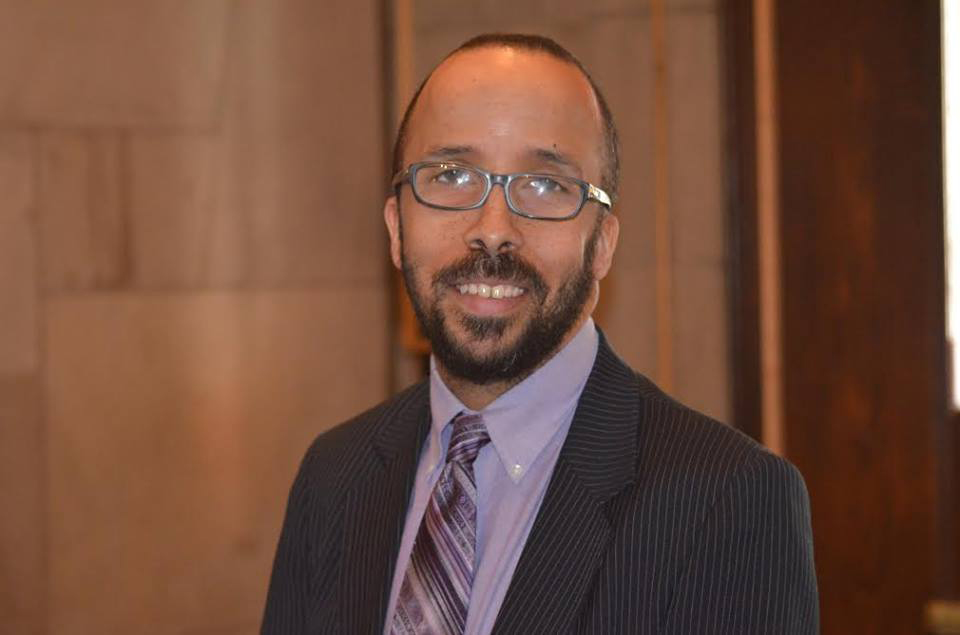What’s at stake in the 2016 elections? The lives of immigrants and refugees.
 For he will hide me in his shelter in the day of trouble; he will conceal me under the cover of his tent; he will set me high on a rock. — Psalm 27:5
For he will hide me in his shelter in the day of trouble; he will conceal me under the cover of his tent; he will set me high on a rock. — Psalm 27:5
If the Christmas story has faded from your memory, here’s a reminder. Mary and Joseph journeyed from Nazareth to Bethlehem to be registered for a census–and the Son of God was born. Jesus was born an immigrant in Herod’s land, but God covered him with His hand.
That’s what the United Church of Christ feels we’re called to do – welcome and cover immigrants with our hands. After all, in the beginning, our nation was a community of immigrants.
For some of us, our ancestors arrived here seeking refuge from those threatening their religious freedom. Ironically, they chose to deny others basic freedoms. Those brought here unwillingly – Black slaves – helped build the United States of America, the land of opportunity.
News of that opportunity, which is exported as the American Dream, draws people from across the border and across the world. Some come seeking a better life. Others flee war-torn countries for America’s relative peace.
Still, others – LGBTQ asylees, for example – flee homophobic home countries for their lives. America has become a “shelter in the day of trouble.” The Psalm, along with other sacred texts, inspired my persronal commitment to help asylees and immigrants looking for better lives.
Local church prophetic witness
I had the privilege of helping to draft a resolution from University Church of Chicago (Hyde Park), which reaffirmed its status as an immigrant-welcoming and sanctuary church. The reaffirmation paved the way for possibly housing Anibal Fuentes-Aguilar in 2014.
University Church welcomed another opportunity to offer sanctuary. It has openly concealed Jose Juan Federico Moreno under the cover of its tent since April. Moreno is a father of five children, who are U.S. citizens. He’s been here for 17 years. Moreno entered sanctuary after exhausting all his appeals.
Offering sanctuary is a University Church tradition. It provided a family fleeing war-torn Guatemala in the 1980s sanctuary. A long-time partnership grew from that gesture.
“Our ministry of accompaniment with the Mayan community of Saqa Ja’ in the Guatemalan highlands began when we gave sanctuary to a family who had escaped the wars in their country. This led to a mission of solidarity that includes helping to rebuild the village of Saqa Ja’ in Guatemala, with University Church members traveling to the village every year since 1998,” its Web site said.
My faith also inspired me to accompany LGBTQ asylees. I served as operations manager of Chicago LGBT Asylum Support Partners (CLASP), which provides food, shelter, transportation and links to legal services for LGBTQ people fleeing anti-gay countries.
Immigrants come and have come to America for a variety of reasons, asylees come for one reason–they’re running for their lives. Another local church, Namaste United Church of Christ, also in Chicago, housed asylees from the Chicago LGBT Asylum Support Partners (CLASP). “Family members,” as CLASP asylees are called, are fleeing anti-LGBTQIA countries. It’s among a number of UCC churches, which have offered solace. I was proud to work alongside the Rev. Dr. Marilyn Pagan-Banks and the congregation of Namaste United Church of Christ to serve CLASP family members.
National prophetic witness
The United Church of Christ has advocated for just policies for immigrants, refugees, asylees and their families by petitioning Congress. More than 115 of our UCC clergy signed on to a letter earlier this year that called on our leaders to enact policies of hospitality.
The letter urges Congressional support for deferred action for families and sensible immigration reform. It also asks the Obama administration to stop the raids on undocumented immigrant families, respect current asylum law, honor existing protections for human trafficking victims and expand legal assistance.
Voting as an Act of Love and Hospitality
The Psalm and sacred text has guided my understanding of what it means to provide radical hospitality. Welcoming the immigrant, providing shelter and community to those escaping danger, to me is radical hospitality.
It makes me proud to see our denomination standing with the oppressed and welcoming the stranger, both through individual acts of sanctuary and through broad efforts to fix our broken immigration system. This election provides us with another opportunity do our part in helping those in need of the most radical hospitality.
Let’s allow our faith to inform our vote.
Related News
Growing Weary
In December 1964 during a speech in Harlem, Fannie Lou Hamer declared: “And you can always...
Read MorePlanning for Earth Month: Resources for Congregations
April is Earth Month, and for congregations, it can be a great time to further discern how...
Read MoreThank You from Our Faith, Our Vote
It's been one week since election day and people across the nation are experiencing a myriad...
Read More


